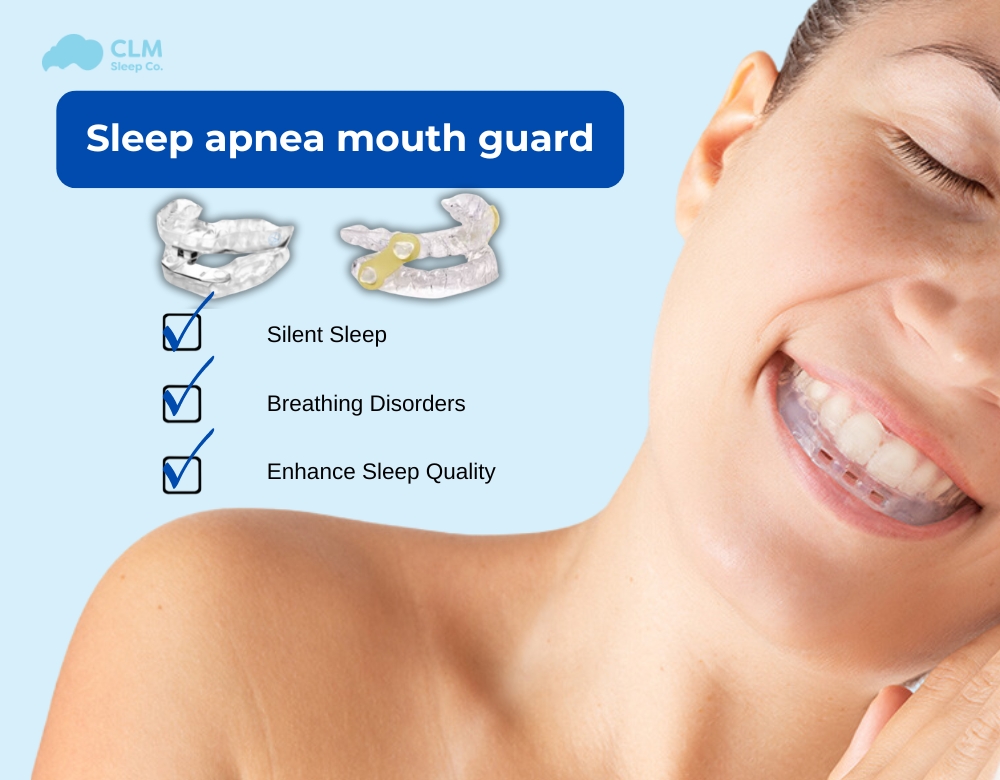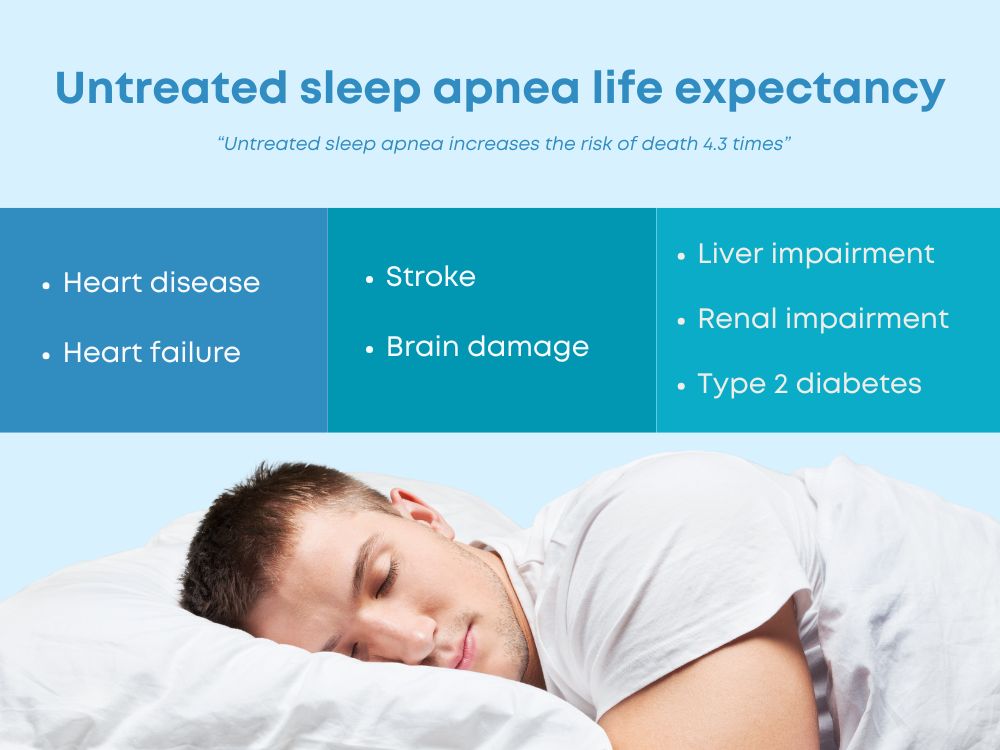A sleep apnea mouth guard is also referred to as a mandibular advancement device. It is an oral appliance used primarily at night and is similar in appearance to a mouthguard. However, it gently assists in treating mild to moderate obstructive sleep apnea by moderately advancing the lower jaw to help eliminate the cause of restriction and the snore-induced airflow, at the upper airway area. Beyond managing snoring, a mandibular advancement device offers an effective alternative to CPAP machines for many obstructive sleep apnea cases. So, what exactly is a sleep apnea mouth guard? Learn more in this detailed article from CLM Sleep.
What is a Sleep Apnea Mouth Guard?
A sleep apnea mouth guard, or an oral appliance, is a dental device designed to keep the airway open during sleep. It’s a common solution healthcare professionals recommend to treat obstructive sleep apnea (OSA).
In obstructive sleep apnea, upper airflow becomes partially or completely obstructed during sleep, reducing the amount of air that passes through the breathing passage. This effect forces the individual’s body to respond by waking up momentarily to restore breathing to a normal rhythm. This cycle may occur many times throughout the sleeping period. It causes poor quality sleep due to interrupted breathing, and the body does not receive its necessary oxygen levels. In untreated cases, OSA has general health consequences that can ultimately be life-threatening.
A sleep apnea mouth guard, also known as oral appliance therapy, works by positioning the mouth in such a way that the airway remains open. This causes lighter, easier breathing and reduces the frequency of OSA-induced awakenings.
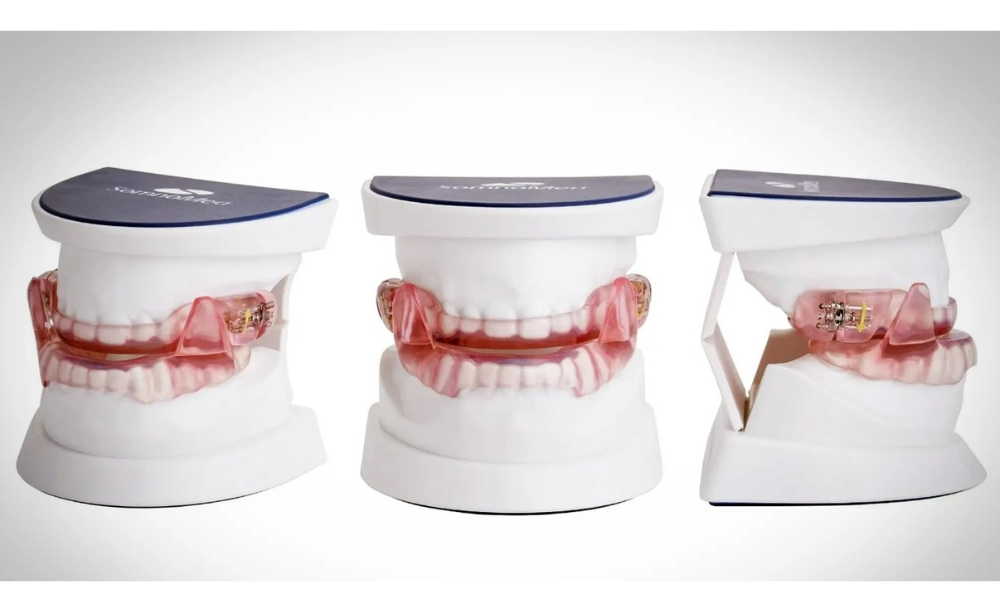
See more: 03 Types Of Sleep Apnea
How Do They Work?
Mouth guards for sleep apnea work by pulling the base of the tongue forward, creating increased space at the back of the throat to improve airflow. Some devices attach directly to the tongue and pull it forward, while most others advance the lower jaw, keeping the tongue in a natural position.
You need to wear the sleep guardian before going to bed and keep it on throughout the night. In the morning, you simply remove the device upon waking.
Types of Sleep Apnea Mouth Guards
There are three main types of mouth guards used to treat sleep apnea: mandibular advancement devices, tongue-retaining devices, and hybrid devices. Here are the details:
Mandibular Advancement Devices (MADs)
Mandibular Advancement Devices (MADs), also known as mandibular repositioning splints or lower jaw positioning devices, are types of plastic oral appliances that completely fit over the teeth on both arches. It helps pull the lower jaw forward by several millimeters or more to create more space in the airway, resulting in improved breathing during sleep. Three main types include the following:
Custom-Fitted Devices
They are individually designed by dentists to fit the specific shape of each patient’s mouth. Custom Masticular Advancement Devices assure maximum comfort and ensure the treatment’s success by adjusting precisely to the dental structure of each person using them. They are usually made of good-quality materials and adjustable to obtain the best possible position.
Boil-and-Bite Devices
This sleep apnea mouth guard option is more accessible, allowing users to create a custom fit at home. The process involves heating the device in hot water to soften it, then biting it down to mold it to the mouth’s shape. While these devices may not offer the same precision and comfort as custom-fitted ones, they provide a cost-effective solution for those seeking to alleviate sleep apnea symptoms.
Adjustable Devices
These oral appliances allow users to modify the degree of jaw advancement. This feature enables gradual adjustments over time, helping users find the most comfortable and effective position to keep the airway open. Adjustable devices are particularly beneficial for patients who must fine-tune their treatment methods to achieve better results.
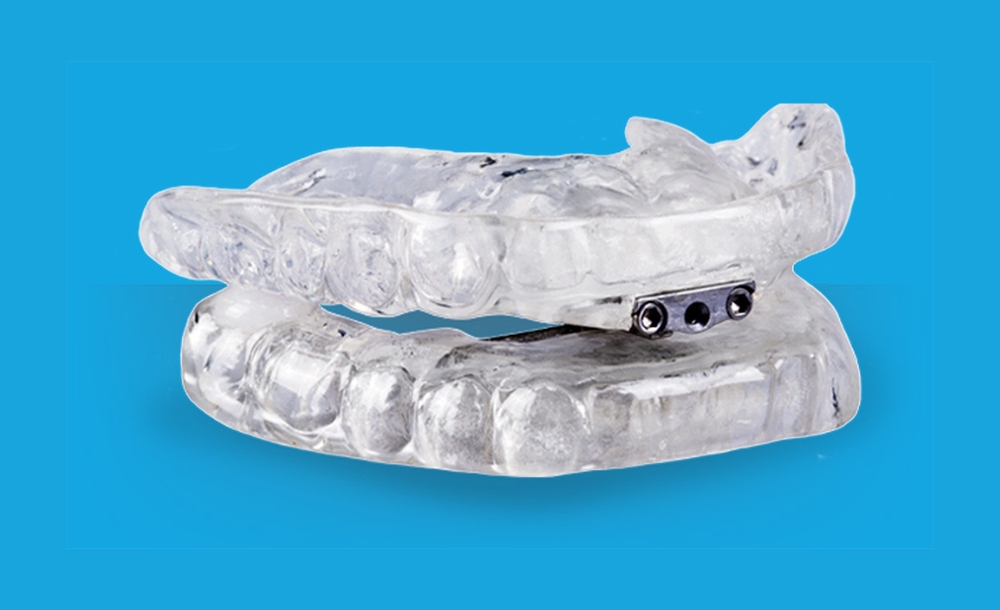
Tongue Retaining Devices (TRDs)
Tongue-retaining devices (TRDs) use suction to hold the tongue forward, preventing it from falling back and obstructing the airway. TRDs are typically used for individuals who do not have enough teeth to support a Mandibular Advancement Device (MAD) or for those who cannot use MADs for other reasons.
While TRDs can be a useful sleep apnea mouth guard option, they have not been studied as extensively as MADs, so their effectiveness in treating Obstructive Sleep Apnea (OSA) is not yet well established. As a result, TRDs are not commonly prescribed or utilized in treatment plans.’
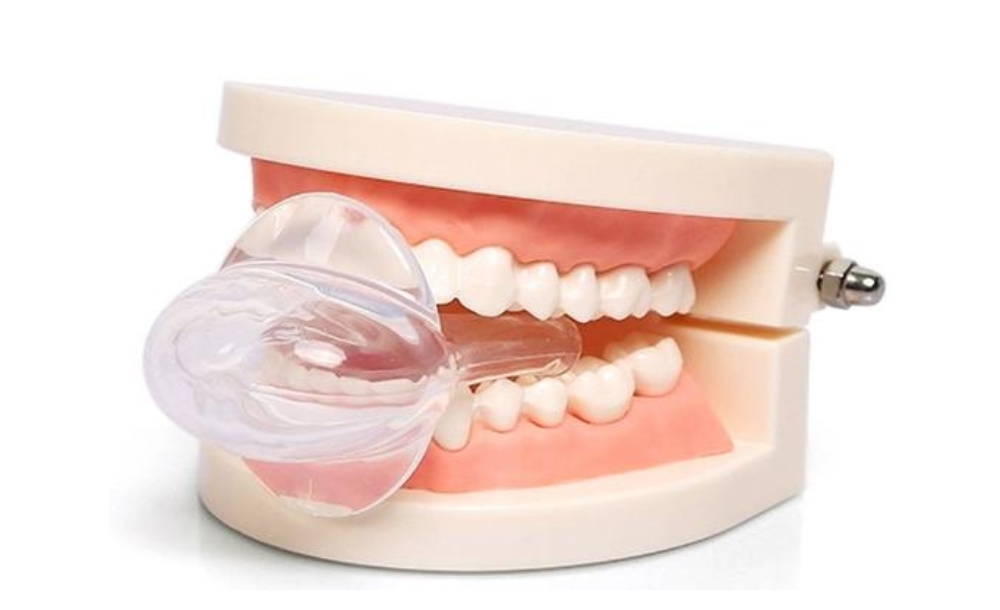
Hybrid Devices
As the name suggests, Hybrid Devices combine the features of Mandibular Advancement Devices (MADs) and Tongue-Retaining Devices (TRDs), providing a more comprehensive approach to managing the airway. They are suitable for patients with varying degrees of obstructive sleep apnea, helping to improve respiratory function and optimize treatment effectiveness. By addressing multiple factors contributing to airway obstruction, hybrid devices can enhance overall sleep quality and reduce snoring more effectively than using a single device alone.
Benefits of Using a Sleep Apnea Mouth Guard
If a sleep apnea mouth guard is suitable for you and your obstructive sleep apnea condition, you can enjoy several benefits, including:
- Less Discomfort: Unlike CPAP therapy, MADs’ compact and lightweight design does not cover your face, making them more comfortable to wear.
- Mouth Breathing: Sleep guardians allow for mouth breathing, which can be beneficial if you have a cold or nasal congestion.
- Reduces Snoring: Sleep apnea mouth guard helps decrease snoring, improving your overall sleep quality.
- Custom Fit: These devices are custom-made to fit your mouth and jaw, ensuring optimal comfort and effectiveness. They can be adjusted as needed.
- Quiet Operation: MADs operate quietly, unlike CPAP machines, which can be noisy.
- Ideal for Restless Sleepers: Sleep guardians are suitable for those who tend to move around in their sleep, as they stay securely in place.
- Convenient and Travel-Friendly: Sleep apnea mouth guards are easy to use and pack, making them a convenient option for travel.
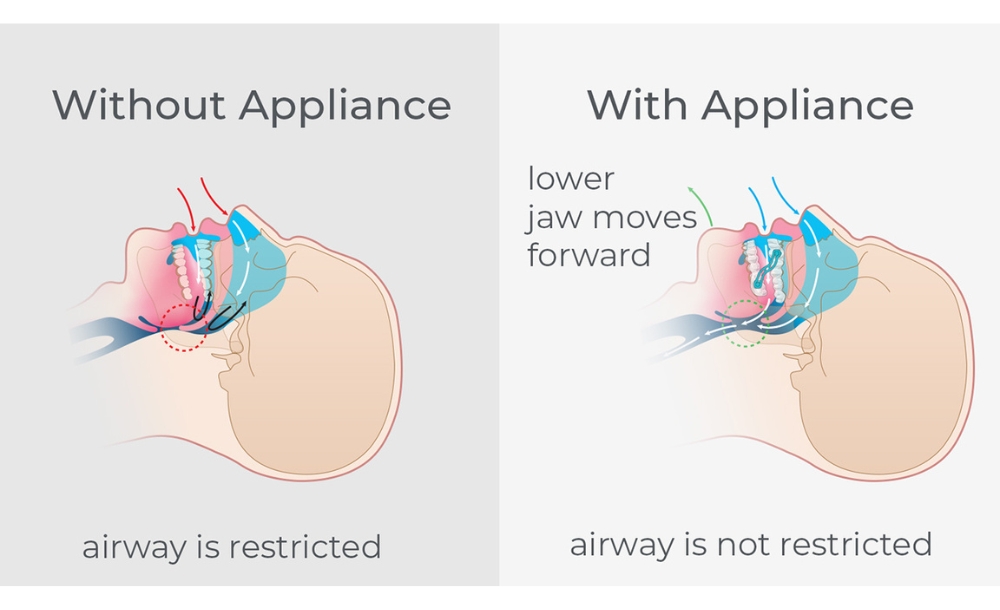
See more: Guide to Sleep Apnea Test At Home: Quick and Easy
Effectiveness
Mandibular Advancement Devices (MADs) are effective in reducing sleep apnea and improving blood oxygen levels during sleep, though their efficacy may not match that of CPAP therapy. Studies indicate that MADs can help reduce daytime sleepiness and snoring and lower blood pressure, similar to CPAP.
Another major advantage is that the use of MADs may also enhance life quality because it stabilizes depression symptoms. Most people find MADs much easier to use than CPAP masks, thus making it practicable as a long-term solution. Dentist-designed custom-fit MADs are usually much comfier and more efficient compared to general, off-the-shelf options.
Another class of devices, the tongue retaining devices (TRD), has not been studied much, but it shows potential in reducing apnea as well as improving the saturation of blood with oxygen and daytime sleepiness.
Ultimately, in the effective treatment of OSA, patients must be compliant with treatment which, in the case of most treatments, research shows nearly half of those prescribed CPAP therapy do not use regularly or discontinue, in all. If they find something like an oral MAD much more comfortable and are willing to use it, they are more likely to benefit from treatment.
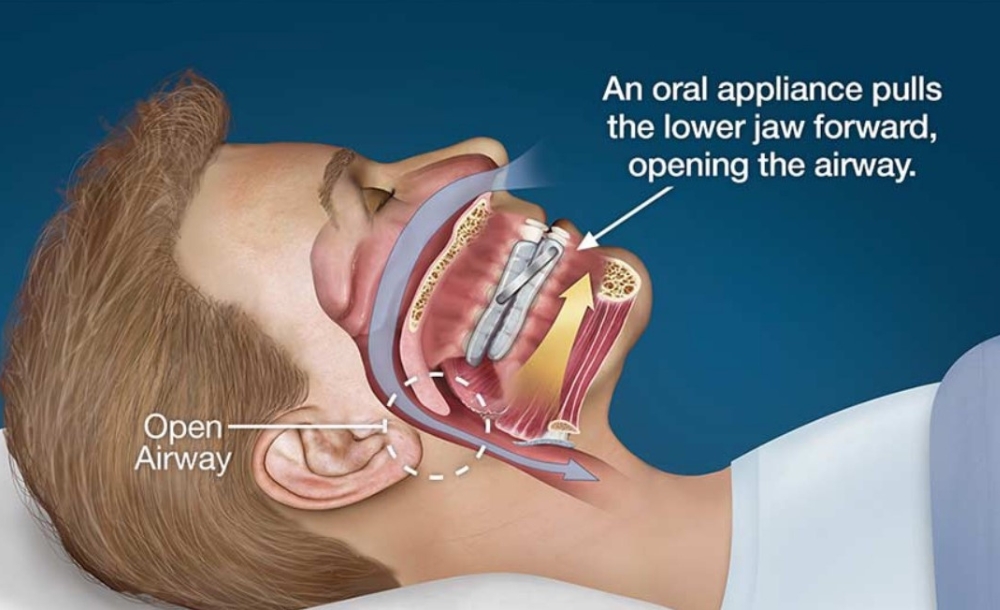
See more: Severe Sleep Apnea: Symptoms and Effective Treatment Options
Who Should Consider a Mouth Guard for Sleep Apnea?
Mouthguards for obstructive sleep apnea (OSA) are designed to be worn exclusively during sleep. They are typically recommended for individuals with mild to moderate OSA who cannot use Continuous Positive Airway Pressure (CPAP) machines. CPAP machines deliver a steady stream of compressed air through a tube and mask, keeping the airway open throughout the night.
While CPAP is the best treatment for improving airflow in individuals with sleep apnea, many people struggle to use it consistently and may discontinue its use over time. Although mouthguards may not be as effective as CPAP, they can still help alleviate symptoms for some individuals.
Additionally, some people choose to combine both mouthguards and CPAP therapy. For example, they might use CPAP at home and a mouthguard while traveling or a mouthguard in conjunction with CPAP to reduce the airflow pressure.
See more: Can Sleep Apnea Kill You? Risks and Consequences
How to get the right Sleep Apnea Mouth Guard?
Selecting the right mouth guard for sleep apnea involves several important factors to ensure both effectiveness and comfort. Here’s a comprehensive guide to help you make the right decision:
- Consult a Healthcare Professional: Before purchasing a mouth guard, visit a dentist or sleep specialist to accurately diagnose your sleep apnea severity. They can recommend suitable options based on your specific condition.
- Choose the Right Type: There are three main types of mouth guards: Mandibular Advancement Devices (MADs), Tongue-Retaining Devices (TRDs), and Hybrid Devices. Select the type that best meets your individual needs.
- Consider Customization: Opt for a device that a dental professional designs for maximum comfort and effectiveness. If a custom option isn’t feasible, consider boil-and-bite devices that you can mold at home.
- Material Quality: Look for mouth guards made from durable and safe materials to ensure comfort during overnight wear.
- Adjustability: Some devices allow for adjustments, enabling you to find the optimal position for your jaw, which enhances both comfort and effectiveness.
- Fit and Comfort: Ensure that the mouth guard fits snugly without causing discomfort. A proper fit is crucial for effective treatment and to avoid soreness or irritation.
- Ease of Cleaning: Choose a mouth guard that is easy to clean and maintain, as good oral hygiene is essential for overall health.
- Insurance and Costs: Check with your insurance provider to see if they cover mouth guards for sleep apnea treatment and inquire about any associated costs.
- Trial Period: If possible, look for options that offer a trial period. This will allow you to assess comfort and effectiveness before committing.
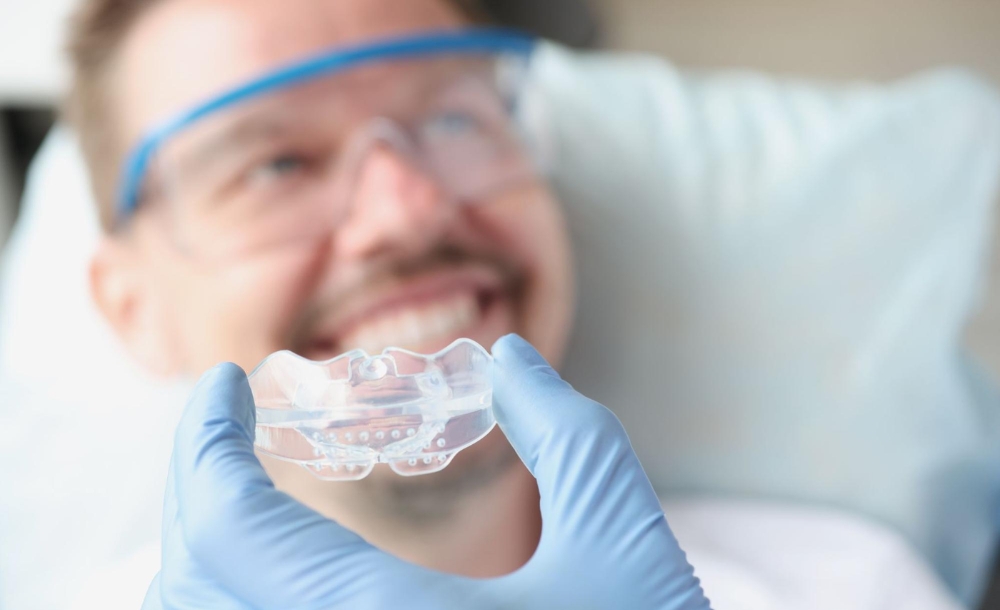
Conclusion of the article
The sleep apnea mouth guard is an effective solution for individuals with obstructive sleep apnea (OSA). This option is ideal for those who find CPAP machines uncomfortable. Devices like Mandibular Advancement Devices (MAD) and Tongue Retaining Devices (TRD) help keep the airway open. They reduce snoring and enhance overall sleep quality. It’s essential to consult with a healthcare professional when selecting a mouth guard to ensure it suits your needs. Factors such as customization, material quality, and ease of cleaning significantly impact the device’s effectiveness and comfort.
While not a complete substitute for CPAP therapy, mouth guards provide a valuable option for improving sleep and health. Regular check-ups with your healthcare provider are necessary to ensure their effectiveness. Timely adjustments can enhance your quality of life. At CLM Sleep, we offer comprehensive diagnostic and treatment services for sleep apnea. Our goal is to help you restore sleep quality and enhance your health. You can also explore other sleep improvement devices at Cpapdiscount.
